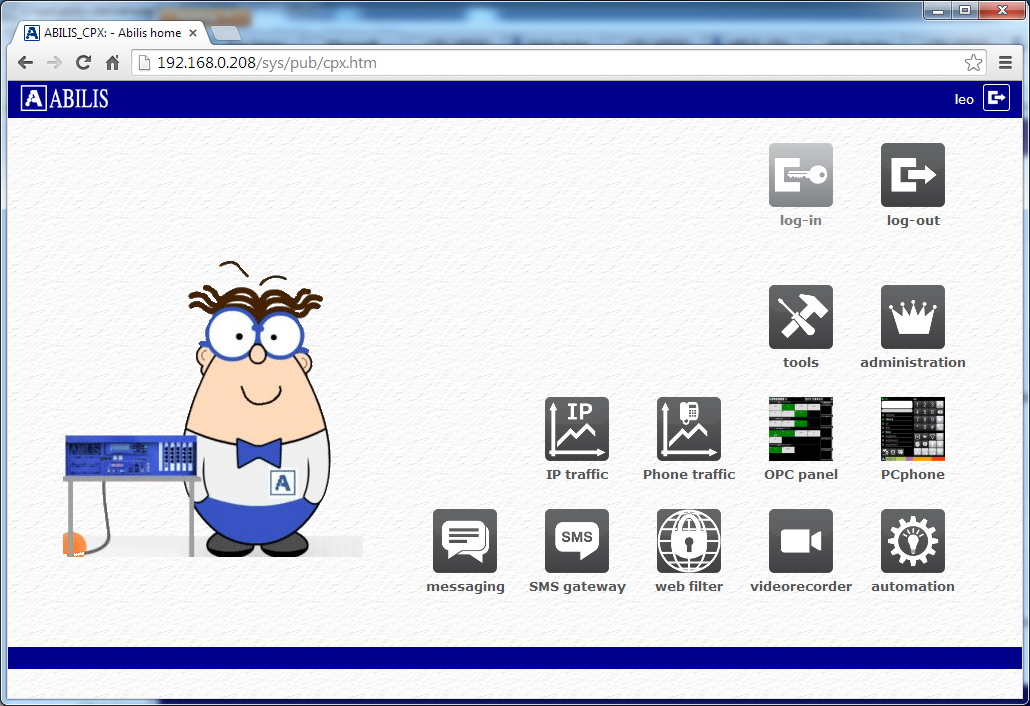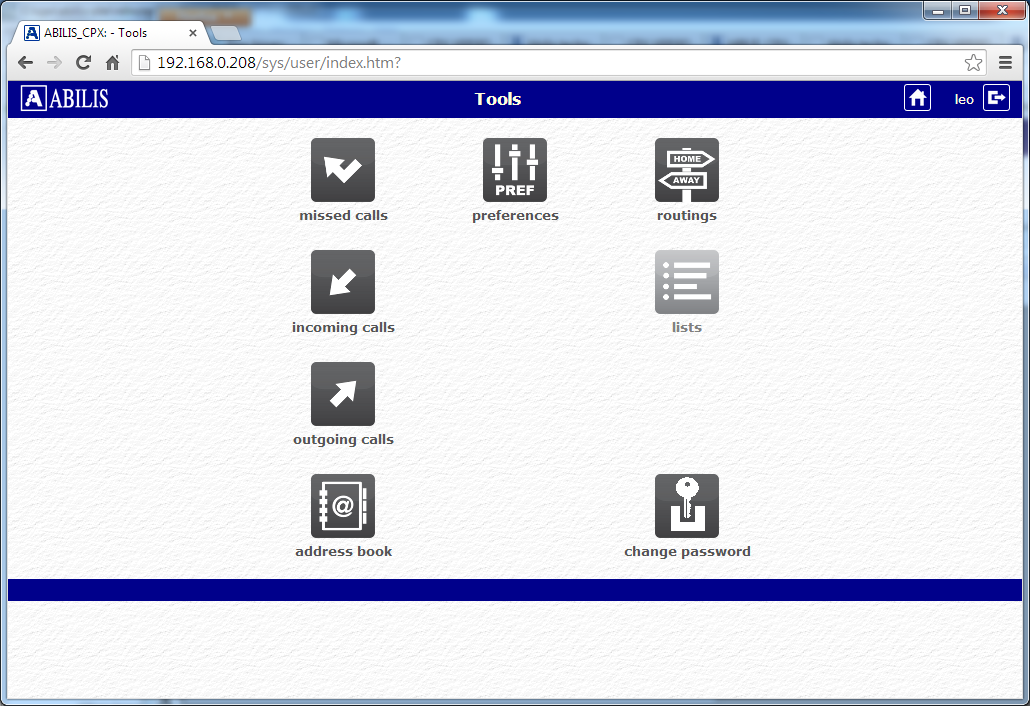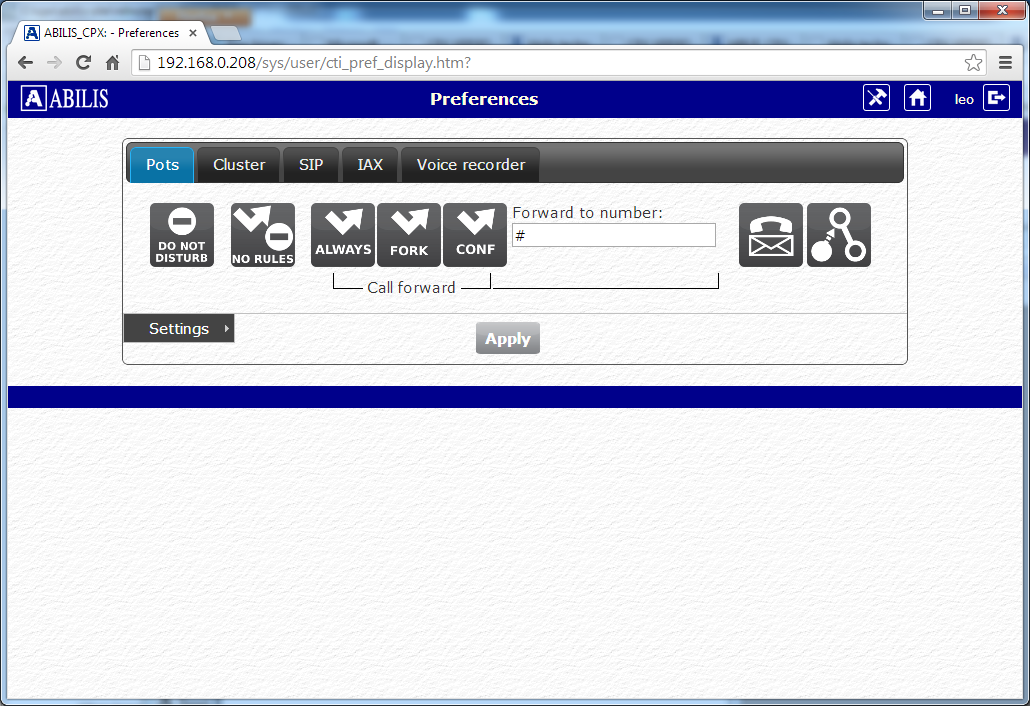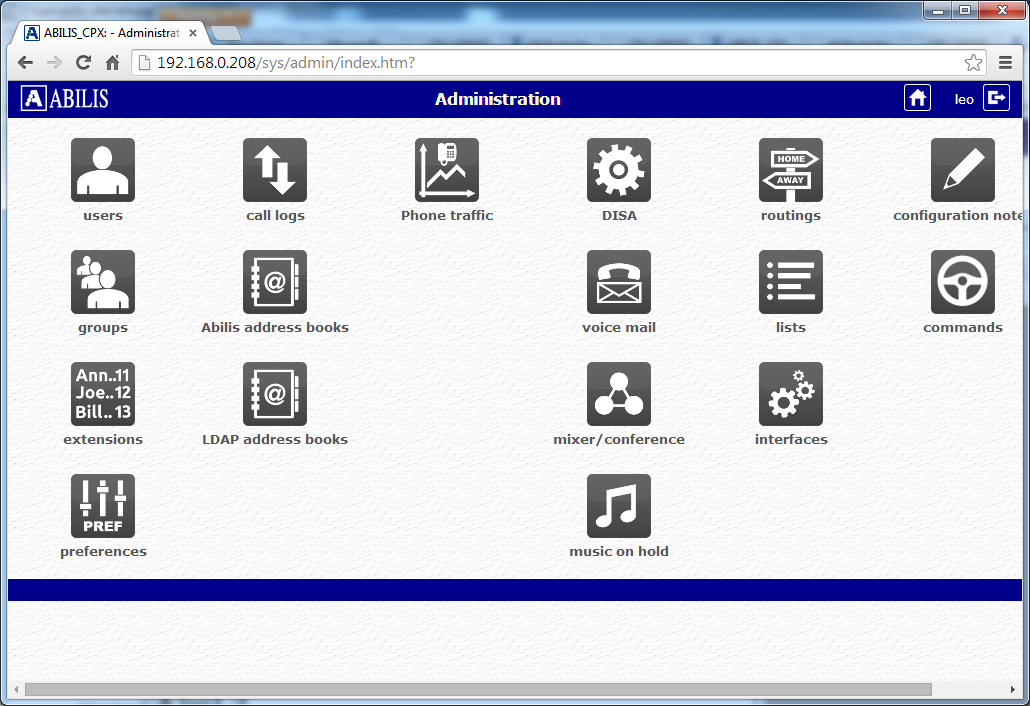Abilis CPX 2000, update 7.8.0
Released on December 20, 2013.
Enhancements
- Licence
-
-
Added licence for NPVEXT (New Packet Voice Extended) and CHAT (XMPP gateway) features.
The update licences scheme is:
Table: Abilis CPX product classes
Class Product Basic devices included FP Former Mini-Abilis FPANEL 0 Former Abilis Base-x MFIDE2/MFIDE3 1 Micro-Abilis MFLPC, BRI4-POTS4 (BS44) or BRI8-ELTI (BS832) 2 Nano-Abilis MFLPC, MiniBRI1 (BR1) 3 Abilis Base-J MFIDE3 4 Mini-Abilis MFIDE3 5 Compact-Abilis MFPCI, ETH3-BRI4-POTS8 (BS48) 6 Abilis Base-K MFIDE3 7 PicoAbilis MFPCMCIA, VoIP (POTS) 8 Micro-Abilis-C3 MFPCIGT, ETH2-BRI4-POTS4 (BS44) or ETH2-BRI4-POTS4-ELTI (BS436) 12 Abilis Base-P MFLPT 13 Abilis Base-Q MFLPT 14 Abilis Base-I and Base-Y MFIDE3 15 Abilis Base-N MFIDE3 16 Pico-Abilis ELTI MFLPT, ETH2-ELTI 17 Micro-Abilis-C3 Low Cost MFPCIGT, ETH2-BRI4-POTS4 (BS44) or ETH2-BRI4-POTS4-ELTI (BS436) Table: Classes with licenced features and additional licences EXTENDED and VMX
Feature Description Class FP Class 0/6/13/15 Class 1/2/4/7/8/16/17 Class 3 Class 5 Class 12/14 EXTENDED VMX DATACOMP Data compression service IPLB IP Load Balancing service YES YES YES YES LCS Last Calling number service YES YES YES MULTILINK Resources over Multi-Links YES YES YES SOFTPBX Soft-PBX service (OPC, Address Book, Click&Call, ...) YES YES YES VMX VMX system YES GPS GPS resources YES ACNT Accounting service YES YES YES TRFA Traffic Analyzer YES YES YES YES OSPF Open Shortest Path First protocol YES FTPSRV FTP server YES YES YES YES YES YES YES YES SMTP SMTP resource YES YES YES YES YES POP3 POP3 resource YES YES YES YES RADIUS RADIUS resource YES YES YES VRRP VRRP resource YES POEAC PPP Over Ethernet Access Concentrator YES YES YES ARCHIVE Archive resource YES YES YES CTIDISA CTI DISA service YES YES YES YES CTIIAX CTI IAX service YES YES YES YES YES YES YES YES CTISIP CTI SIP service YES YES YES YES YES YES YES YES CTISMS CTI SMS service YES YES YES AIPT Number of AIPT (Abilis tunnel) resources [0, 1..250] 4 250 2 4 4 4 32 32 IKEHOSTS Number of IKE hosts [0, 1..128] (IPSEC/IKE resources) 2 128 1 2 1 2 4 4 IPSH IP traffic shaping service LDAP LDAP service SWAC Number of SWAC channels [0, 1..255] SIPBLF Busy Lamp Field for SIP VS Videosurveillance ABILISPHONE AbilisPhones users in SIP PCPHONE Pc-Phones users in CTIP NPVEXT New Packet Voice extended CHAT Number of CHAT (XMPP) users [0, 1..1023]
-
- Management via web
-
-
The Abilis web interface has been renewed for a more pleasant user experience.
The home page permits a quick and intuitive access to the services.
The end-user has a series of useful tools reachable under the "tools" icon, such as preferences, call logs, address book.
The system administrator has a section from where many administrative actions can be performed. Just few pages have been restyled here, more will follow in future versions.
The home page also offer the possibility to replace the Abilis comic with a 300x300 pixels gif. If desired, a gif file named company_logo_300x300.gif must be placed in the path specified by parameter WDIR: of http driver, default WDIR:C:\APP\HTTP\.
Here are some screenshots:
Figure: Home

Figure: Tools

Figure: Preferences

Figure: Administration

-
Added LDAP rights management page in HTTP interface.
-
- Cti router
-
-
Added runtime codec change feature (RCC).
When transcoding is required as result of a transfer, forward, or just because of routing requirements, Abilis automatically finds a common codec available at both sides and tries to change the codec of one of the two side in order to avoid the transcoding, of course respecting the negotiated maximal speed.
The reason for this behaviour is that transcoding is an operation that degrades the quality, may increase delays, and occupies resources (DSP or CPU). When transcoding is avoidable it is far much better to avoid it.
-
- Sip
-
-
Improved logging in INFO level, user, caller and called number are now logged. Moved some registration message to REG level.
-
- NPV
-
Added driver for "new packet voice".
This driver permits to create packet voices for IP with the following benefits:
secure authentication using asymmetrical keys (RSA)
identification using ABILIS-ID (abilis serial number) or user defined key, or both
the default 256 packet voices can be extended to 1000 with the purchase of a licence
one local UDP port used for all remotes
coexistence with former packet voices and any other resource that can be referred by CTIL
configuration of CTIL directly from NPV (more precisely from NPV Links)
ISDN backups optimised and shared among all NPV Links
overhead lower than ext-client / ext-server combination
more sophisticated, and more precise, detection of link problems
easy configuration of double-path
option for unidirectional or bidirectional ciphering of voice packets with key regenerated at every new connection
[13:07:39] ABILIS_CPX:d p npv RES:NPv ----------------------------------------------------------------------- Run DESCR: LOG:DS ACT:YES NPVLOG:DFT npvlogsize:200 LOCPORT:38383 REMPORT:38383 BCKRES:CtiSLink max-bck:10 MTU:750 INBUF:AUTO INBUF-LINK:AUTO V-TOS:0-D C-TOS:0-D V-TOUT:10 V-RED:NONE LOCIP1:OUT-IP LOCIP2:OUT-IP - Link-Check ----------------------------------------------------------- TRY:5 TOUT:5000 BURST:1 DLY-UP:10 DLY-TOUT:3 THR-DN:30 BURST-DLY:100 - Back-Up -------------------------------------------------------------- TI:ALL,00:00-23:59 BOOT-DLY:NO DOWN-DLY:NO RTY:LIN NRTY:0 TB:3 AC:DOD VDT:10 [13:07:42] ABILIS_CPX:d npvl Configured Links:2 Activated Links:56 ------------------------------------------------------------------------------- ID: CLUS: MAXBW: MAXCON: GROUP: (GROUP-MAXBW: GROUP-MAXCON:) ACT: ROLE: REMABILIS-ID: REMKEY: LOCKEY: CR: BCK: LOCIP1: REMIP1: LOCIP2: REMIP2: CDI: CDO: RTY: CGI: CGO: NRTY: SDI: SDO: AC: SGI: SGO: ------------------------------------------------------------------------------- 50 npv50 NOMAX NOMAX NONE SERVER test51 test50 NO NO SYS * SYS # ------------------------------------------------------------------------------- 51 npv51 NOMAX NOMAX NONE CLIENT test50 test51 NO NO SYS 127.000.000.001 SYS # ------------------------------------------------------------------------------- [13:07:45] ABILIS_CPX:d d npv RES:NPv ----------------------------------------------------------------------- NPV-STATE:READY CUR-LINKS:2 LINKS-READY:2 UDP-STATE:READY MAX-LINKS:56 LINKS-DOWN:0 BCK-STATE:READY [13:07:51] ABILIS_CPX:d d npvl ID: CLUS: STATE: RemID: Path1: Path2: Bck: Bck-Chan: CR: ------------------------------------------------------------------------------- 50 npv50 READY 51 UP - - - NO 51 npv51 READY 50 UP - - - NO [13:07:56] ABILIS_CPX:d de npvl ID: CLUS: STATE: RemID: Path1: Path2: Bck: Bck-Chan: CR: RemIP1: RemIP2: RTY: USRTY: TDEL: TREM: VDT: ------------------------------------------------------------------------------- 50 npv50 READY 51 UP - - - NO 127.000.000.001-38383 - -------------------------------------------------------------------------- 51 npv51 READY 50 UP - - - NO 127.000.000.001-38383 - -------------------------------------------------------------------------- [13:08:03] ABILIS_CPX:d p npv ? NPv resource parameter(s): DESCR: Resource description. From 0 up to 79 Alphanumeric extended characters. Case is preserved. Spaces are allowed. Strings holding spaces must be written between quotation marks (E.g.: "str1 str2") LOG: State changes log and alarm generation [NO, D, S, A, L, T, ALL] [+E] (D: Debug Log; S: System Log; A: Alarm view; L: Local audible alarm; T: SNMP traps; +E: Extended Log of state changes, see ref. manual) ACT: Operation activation [NO, YES] NPVLOG: NPV log events filter [ERR, INFO, DBG] or [DFT, FULL], where - ERR, INFO, DBG filters can be joined using "," operator; - DFT: means ERR and INFO events; - FULL: means every type of event. npvlogsize: NPV Log size [20..2000 Kibyte] LOCPORT: Local UDP port number [1..65535] REMPORT: Remote UDP port number [1..65535] MTU: Maximum frame length [256..1500] BCKRES: Lower Back-up resource [NONE, CtiSlink] max-bck: Maximum number of backups allowed [0..250] INBUF: Incoming buffer size [AUTO, 10..60000 Kibyte] INBUF-LINK: Incoming session buffer maximum size [AUTO, 10..1000 Kibyte] V-TOS: Type Of Service octet or Differentiated Services Field (DS) for VOICE frames: - 'p-t', i.e. PRECEDENCE and TOS values, where 'p' can be [0..7] and 't' can be [N=None, D=Min. Delay, T=Max. Throughput, R=Max. Reliability, C=Min. Monetary Cost] - 'bbbbbb', i.e. DS value bit by bit, where 'b' can be [0, 1] C-TOS: Type Of Service octet or Differentiated Services Field (DS) for LINK-CHECK frames: - 'p-t', i.e. PRECEDENCE and TOS values, where 'p' can be [0..7] and 't' can be [N=None, D=Min. Delay, T=Max. Throughput, R=Max. Reliability, C=Min. Monetary Cost] - 'bbbbbb', i.e. DS value bit by bit, where 'b' can be [0, 1] V-TOUT: Time limit for out-of-sequence VOICE frames parking [0..500 msec] V-RED: VOICE frames redundancy [NONE, FM, VOICE, ALL] LOCIP1: Local IP address for incoming/outgoing UDP pakets on first path [R-ID, OUT-IP, Ip-nnn, 1-126.x.x.x, 127.0.0.1, 128-223.x.x.x] LOCIP2: Local IP address for incoming/outgoing UDP pakets on second path [R-ID, OUT-IP, Ip-nnn, 1-126.x.x.x, 127.0.0.1, 128-223.x.x.x] ---------- Link-Check --------------------------------------------------------- TRY: Number of attempts considered for the state detection [2..50] TOUT: Timeout for the link-check reply reception [100.10000 msec] DLY-UP: Interval between attempts while state is UP [1..60 sec] DLY-TOUT: Interval between attempts while state is UP and last try timed out [1..60 sec] THR-DN: Percentage of successful attempts to declare state DOWN [0..90] BURST: Number of requests sent at each attempt [1..10] BURST-DLY: Interval between requests of the same attempt [0..100 msec] ---------- Back-Up ------------------------------------------------------------ TI: Time interval within which the call is permitted or kept active. The the format is "day,hh:mm-hh:mm", where 'day' can be: - a single day of the week [MO, TU, WE, TH, FR, SA, SU] or - a set of days of the week (E.g.: MO+TH or TU+TH+SU) or - an interval of days of the week (E.g.: MO-WE or TH-SU) or - "ALL". Use "#" to disable the time interval. BOOT-DLY: Time that must elapse since system boot prior that the call is permitted [NO, 1..3600 sec] DOWN-DLY: Time that must elapse since P-Link goes down prior that the call is permitted [NO, 1..3600 sec] RTY: Retry law type [LIN, INC, US] NRTY: Max number of consecutive calls [NOMAX, 0..50000] TB: Time base for delay between calls [3..250 sec] AC: Autoconnection mode [DOD, NAILED-UP] VDT: Disconnect time-out for VOICE [NOMAX, 5..900 sec] [13:08:07] ABILIS_CPX:d p npvl ? D [P] NPVL Display all NPV Links D [P] NPVL filter:val [filter:val] Display any NPV Link matching the specified filter(s) Allowed filters: ID: NPV link identifier. <Optional> One value in the range [1..1000] or a range of values 'xxx-yyy' or a list of values 'xxx,yyy,...' separated by ',' (comma) or "A" or "ALL". CLUS: A CTI Cluster name, from 1 up to 8 characters in the <Optional> ['0'..'9', 'A'..'Z', 'a'..'z', '_', ':'], or a string preceded and/or followed by '*' (E.g.: "*mystr" or "mystr*" or "*mystr*") or "*" or "#" or "NONE". GROUP: CTI Group identifier [NONE, 1..256] <Optional> MAXBW: Maximum bandwidth [0..10000000 bit/sec, NOMAX] <Optional> MAXCON: Maximum number of connections [0..4096, NOMAX] <Optional> REMABILIS-IRemote ABILIS-ID. Up to 10 digits. <Optional> Empty value shows records with empty REMABILIS-ID. REMKEY: Remote key. Up to 16 alphanumeric characters. <Optional> Spaces are not allowed. Case is preserved. The match is case-insensitive. Empty value shows records with empty REMKEY. REMIP1: Remote IP address configured for first path <Optional> [*, #, 1-126.x.x.x, 127.0.0.1, 128-223.x.x.x, 'list'], where - "#": the first path is disabled; - "*": any remote peer is accepted; - 'list': the name of an IP/IR/RU/MR list between single quotes. REMIP2: Remote IP address configured for second path <Optional> [*, #, 1-126.x.x.x, 127.0.0.1, 128-223.x.x.x, 'list'], where - "#": the first path is disabled; - "*": any remote peer is accepted; - 'list': the name of an IP/IR/RU/MR list between single quotes. NPV link parameter(s): ACT: Run time activation/deativation flag [NO, YES] LOG: State changes log and alarm generation: "SYS" or [NO, D, S, A, L, T, ALL] [+E] (D: Debug Log; S: System Log; A: Alarm view; L: Local audible alarm; T: SNMP traps; +E: Extended Log of state changes, see ref. manual) CLUS: CTI Cluster name, from 1 up to 8 characters in the range ['0'..'9', 'A'..'Z', 'a'..'z', '_', ':'], or "#" or "NONE" GROUP: CTI Group which the link belongs to [NONE, 1..256] MAXBW: Maximum bandwidth [0..10000000 bit/sec, NOMAX] MAXCON: Maximum number of connections [0..4096, NOMAX] ROLE: Role for link behaviour [CLIENT, SERVER, PEER] BCK: Backup activation/deactivation [NO, YES] CR: Encryption/Decryption activation [NO, YES] REMABILIS-ID: Abilis-ID that must match the one provided by the remote peer. Up to 10 numeric characters ['0'..'9']. When empty the received Abilis-ID is not validated. The couple <REMABILIS-ID,REMKEY> must be univocal among all links. REMKEY: Identification key that must match the one provided by remote peer. Up to 16 alphanumeric characters. Speaces are not allowed. Case is preserved. The match is case-insensitive. When empty the received identification key is not validated. The couple <REMABILIS-ID,REMKEY> must be univocal among all links. LOCKEY: Identification key to send to remote peer. Up to 16 alphanumeric characters. Speaces are not allowed. Case is preserved. V-TOS: Type Of Service octet or Differentiated Services Field (DS) for VOICE frames: "SYS" or - 'p-t', i.e. PRECEDENCE and TOS values, where 'p' can be [0..7] and 't' can be [N=None, D=Min. Delay, T=Max. Throughput, R=Max. Reliability, C=Min. Monetary Cost] - 'bbbbbb', i.e. DS value bit by bit, where 'b' can be [0, 1] C-TOS: Type Of Service octet or Differentiated Services Field (DS) for LINK-CHECK frames: "SYS" or - 'p-t', i.e. PRECEDENCE and TOS values, where 'p' can be [0..7] and 't' can be [N=None, D=Min. Delay, T=Max. Throughput, R=Max. Reliability, C=Min. Monetary Cost] - 'bbbbbb', i.e. DS value bit by bit, where 'b' can be [0, 1] V-TOUT: Time limit for out-of-sequence VOICE frames parking [SYS, 0..500 msec] V-RED: VOICE frames redundancy [SYS, NONE, FM, VOICE, ALL] REMPORT: Remote UDP port number [SYS, 1..65535] <Only for ROLE not equal to "SERVER"> LOCIP1: Local IP address for incoming/outgoing UDP pakets on first path [SYS, R-ID, OUT-IP, Ip-nnn, 1-126.x.x.x, 127.0.0.1, 128-223.x.x.x] REMIP1: Remote IP address for incoming/outgoing UDP pakets on first path [*, #, 1-126.x.x.x, 127.0.0.1, 128-223.x.x.x, 'list'], where - "#": the first path is disabled; - "*": any remote peer is accepted (only for ROLE:SERVER); - 'list': the name of an IP/IR/RU/MR list between single quotes (only for ROLE:SERVER). LOCIP2: Local IP address for incoming/outgoing UDP pakets on second path [SYS, R-ID, OUT-IP, Ip-nnn, 1-126.x.x.x, 127.0.0.1, 128-223.x.x.x] REMIP2: Remote IP address for incoming/outgoing UDP pakets on second path [*, #, 1-126.x.x.x, 127.0.0.1, 128-223.x.x.x, 'list'], where - "#": the second path is disabled; - "*": any remote peer is accepted (only for ROLE:SERVER); - 'list': the name of an IP/IR/RU/MR list between single quotes (only for ROLE:SERVER). ---------- Link-Check --------------------------------------------------------- LC-VALUES: Link-check values source [SYS, LINK] TOUT: Timeout for the link-check reply reception [100.10000 msec] <Only for TYPE not equal to "SYS"> TRY: Number of attempts considered for the state detection [2..50] <Only for TYPE not equal to "SYS"> DLY-UP: Interval between attempts while state is UP [1..60 sec] <Only for TYPE not equal to "SYS"> DLY-TOUT: Interval between attempts while state is UP and last try timed out [1..60 sec] <Only for TYPE not equal to "SYS"> THR-DN: Percentage of successful attempts to declare state DOWN [0..90] <Only for TYPE not equal to "SYS"> BURST: Number of requests sent at each attempt [1..10] <Only for TYPE not equal to "SYS"> BURST-DLY: Interval between requests of the same attempt [0..100 msec] <Only for TYPE not equal to "SYS"> ---------- Back-Up ------------------------------------------------------------ TI: Time interval within which the call is permitted or kept active. "SYS" or a string in the format "day,hh:mm-hh:mm", where 'day' can be: - a single day of the week [MO, TU, WE, TH, FR, SA, SU] or - a set of days of the week (E.g.: MO+TH or TU+TH+SU) or - an interval of days of the week (E.g.: MO-WE or TH-SU) or - "ALL". Use "#" to disable the time interval. BOOT-DLY: Time that must elapse since system boot prior that the call is permitted [SYS, NO, 1..3600 sec] DOWN-DLY: Time that must elapse since P-Link goes down prior that the call is permitted [SYS, NO, 1..3600 sec] RTY: Retry law type [SYS, LIN, INC, US] NRTY: Max number of consecutive calls [SYS, NOMAX, 0..50000] TB: Time base for delay between calls [SYS, 3..250 sec] AC: Autoconnection mode [SYS, DOD, NAILED-UP] VDT: Disconnect time-out for VOICE [SYS, NOMAX, 5..900 sec] CDI: Input called address [0..9, *] optionally preceded by TON [u, i, n, o, s, h, c] and/or NP [x, e, d, t, l, p] attributes. See HELP ISDN ATTRIBUTES for details on attributes. See HELP ISDN VALUES for details on meaning of special values. CGI: Input calling address [0..9, *] optionally preceded by TON [u, i, n, o, s, h, c] and/or NP [x, e, d, t, l, p] and/or PI [a, r, m, q] and/or SI [y, v, w, z, j] attributes. See HELP ISDN ATTRIBUTES for details on attributes. See HELP ISDN VALUES for details on meaning of special values. SDI: Input called sub-address [AlphaNumExt, *]. See HELP ISDN VALUES for details on meaning of special values. SGI: Input calling sub-address [AlphaNumExt, *]. See HELP ISDN VALUES for details on meaning of special values. CDO: Output called address [0..9, #] optionally preceded by TON [u, i, n, o, s, h, c] and/or NP [x, e, d, t, l, p] attributes. See HELP ISDN ATTRIBUTES for details on attributes. See HELP ISDN VALUES for details on meaning of special values. CGO: Output calling address [0..9, #] optionally preceded by TON [u, i, n, o, s, h, c] and/or NP [x, e, d, t, l, p] and/or PI [a, r, m, q] and/or SI [y, v, w, z] attributes. See HELP ISDN ATTRIBUTES for details on attributes. See HELP ISDN VALUES for details on meaning of special values. SDO: Output called sub-address [AlphaNumExt, #]. See HELP ISDN VALUES for details on meaning of special values. SGO: Output calling sub-address [AlphaNumExt, #]. See HELP ISDN VALUES for details on meaning of special values. [13:08:09] ABILIS_CPX:
- All
-
-
All bug fixes up to 7.7.7 are included in 7.8.0
-